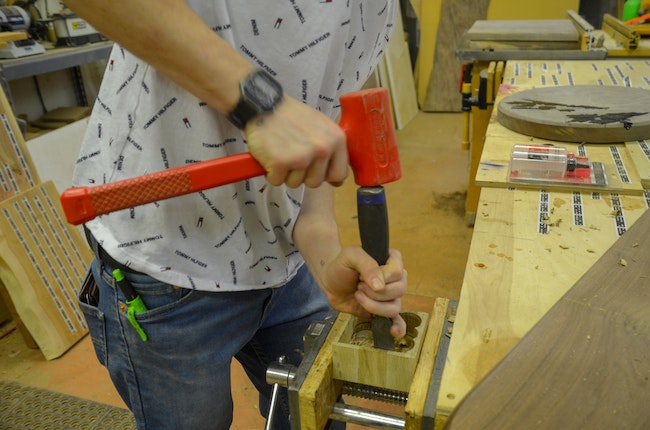
Trey, a 16-year-old staff assistant in the Marion County juvenile department wood shop, chisels a jewelry box on Dec. 31, 2019. (Rachel Alexander/Salem Reporter)
On the last day of the year, three teens stood in a muddy yard in northeast Salem, chopping wood and feeding it through a log splitter.
Inside a nearby wood shop, two boys polished a round piece of black walnut as another chiseled detail into a small jewelry box.
They’re all part of Marion County’s alternative juvenile justice program, a way for young people to work off court-ordered fines and restitution while learning useful skills.
Trey, 16, has spent about three months in the wood shop, working off about $7,300 he owes after breaking into a store. Salem Reporter agreed not to publish his last name to protect the confidentiality of teens in the program.
He’s at ease in the small space, familiar with the tools, and now works as a “staff assistant,” helping other young people new to the work.
“If I’m not busy, I tend to do stupid stuff,” he said. “Coming here every day and just working takes your mind off things. It helps.”
Work programs aren’t unusual in juvenile justice systems, but Marion County’s wood and metal shops are unique.
On Dec. 31, the shop was humming as staff worked with youth to make tables and cabinetry for the new juvenile justice administration center, set to open next week. They’re also working on custom orders of tables for local restaurants and smaller handcrafted items to be sold.
Scott Miranda has been the vision behind the wood program’s growth over the past five years. He came to the juvenile department after a career as a general contractor, where he’d grown weary of managing employees and dealing with paperwork and red tape. The young people he works with in juvenile justice are much easier to deal with, he said.
“When I get the youth, they have no confidence,” Miranda said. After about 30 days in the shop, he sees a turnaround as they complete their first project.
“They get a huge boost of self-confidence,” he said.
 Scott Miranda, Marion County Juvenile Department wood shop manager, explains how he’s expanded the wood program with help from teens over the past five years. (Rachel Alexander/Salem Reporter)
Scott Miranda, Marion County Juvenile Department wood shop manager, explains how he’s expanded the wood program with help from teens over the past five years. (Rachel Alexander/Salem Reporter)
When Miranda started with the juvenile department, the program took in salvaged wood from city and county public works projects and processed most of it into firewood.
Justin Sparrow, director of alternative programs, said Miranda pointed out much of the wood could be put to better use crafting furniture or other items.
The program has developed since then, with a new mill, a kiln for drying wood and other features, built by Miranda and youth. Right now, they’re working mostly with black walnut from a tree the city of Salem had to cut down.
Young people get assigned to one of the county’s alternative programs as part of their court proceedings. The amount of time they spend there and the type of work they do depends on their case and school schedule.
[Keep local news alive in Salem – subscribe today]
Most start in a more general labor program, called matrix, doing work like hauling wood or splitting logs.
Sparrow described it as “work that anyone can pick up in a day or two.”
But those who excel or have more money to repay can work their way to a wood or metal shop assignment, doing more specialized labor.
Work schedules vary depending on the teen. Those expelled from school or otherwise not attending classes may spend full 8-hour days working in the shop alongside Miranda.
Others who are in school may complete their hours during school breaks or over the summer.
“We’re not looking to interfere with their education at all,” Sparrow said.
 Teens chop wood at the Marion County Juvenile Department on Dec. 31, 2019. (Rachel Alexander/Salem Reporter)
Teens chop wood at the Marion County Juvenile Department on Dec. 31, 2019. (Rachel Alexander/Salem Reporter)
The teens are paid on a scale starting at about $5 an hour and can earn more than minimum wage if they demonstrate good work habits.
Most have about $1,000 to $2,000 to work off from their cases. Once they’ve paid their debt, they have the option to keep the job to continue learning more skills.
Many of the smaller items the teens make are for sale in the Fresh Start Market and Espresso, a storefront at the juvenile justice program headquarters on Northeast Center Street.
The café is part of the juvenile department’s alternative programs for teens to learn barista and customer service skills.
“Most of our business is being done through word of mouth,” Sparrow said.
Still, they have trouble keeping their storefront stocked with handmade wood items. The holiday gift season cleaned out their cutting boards.
“It’s a good problem to have,” he said.
Trey said he’s enjoyed the work so far and is considering a career in carpentry. He’s not in school now, he said, but plans to re-enroll for spring semester.
When they first start “a lot of kids think that this is an awful place to be,” he said of the wood shop. He said many don’t realize how much worse their other options are. One option discussed in his case was being placed at an Oregon Youth Authority facility, a much more restrictive option.
“Everybody here’s really nice,” he said.
His first project was a band saw box, a common beginning woodworking project that’s cut with only a band saw. He “messed up a couple times,” he said, but figured it out with Miranda’s help.
Miranda wants to expand the job-training aspects of the wood shop by partnering with more local businesses.
Right now, teens leave with a list of tools they’ve been trained on. He’d like to have a list of willing local employers who could use them on real jobs and get more custom orders for the shop so the teens can practice the business side of woodworking too.
“Most people in the community don’t know we’re here,” he said.
In the longer term, he’d like the program to be self-sustaining, funded by money from the sale of wood products.
Anyone interested in buying a wood product or making a custom order can contact the Fresh Start Market, 3020 Center St NE, or at 503-585-4956, from 7 a.m. to 4:30 p.m. weekdays. Firewood from the program is also available online.
Learn how we do our work at Salem Reporter – read our principles.
Reporter Rachel Alexander: [email protected] or 503-575-1241.

Rachel Alexander is Salem Reporter’s managing editor. She joined Salem Reporter when it was founded in 2018 and covers city news, education, nonprofits and a little bit of everything else. She’s been a journalist in Oregon and Washington for a decade. Outside of work, she’s a skater and board member with Salem’s Cherry City Roller Derby and can often be found with her nose buried in a book.









